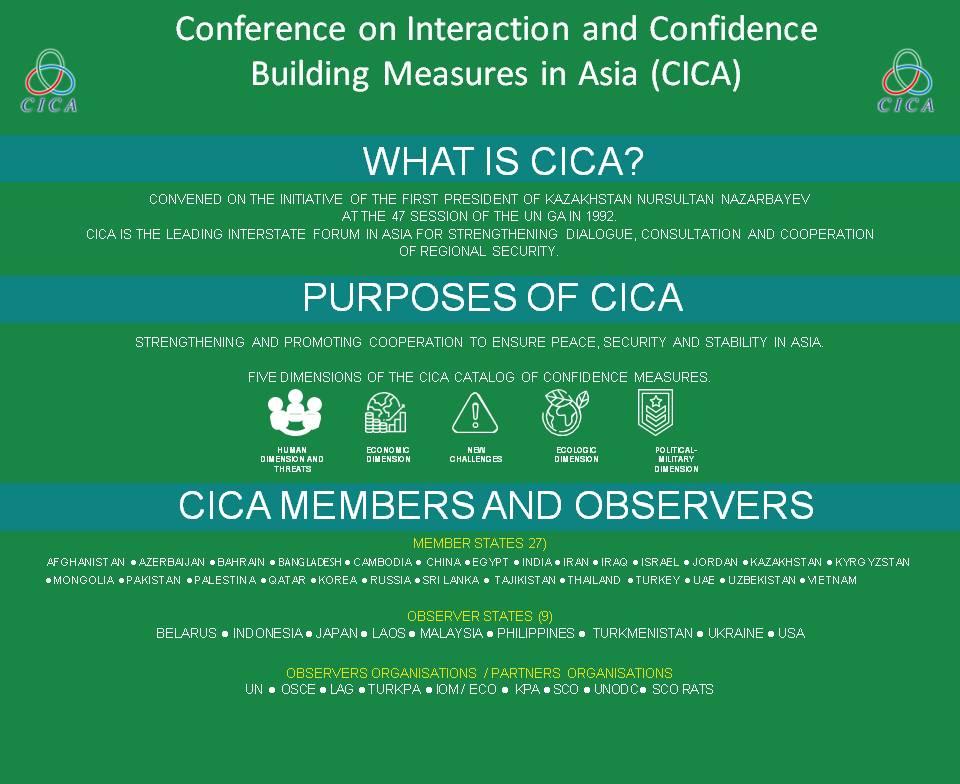Conference on Interaction and Confidence Building Measures in Asia (CICA)

Overview
The Conference on Interaction and Confidence Building Measures in Asia (CICA) is an interstate forum for enhancing cooperation towards promoting peace, security and stability in Asia. The organisation includes 27 member states, 9 observer states, 5 observer organisations and 5 partner organisations, making it the major forum in Asia covering more than 50 percent of the world’s population.
The two founding documents of CICA are the Declaration on the Principles Guiding Relations between the CICA Member States, adopted in 1999, and the Almaty Act, the charter of the CICA, adopted in 2002.
The CICA member states believe that peace and security in Asia can be achieved through dialogue and cooperation leading to a common indivisible area of security in Asia where all states co-exist peacefully and their peoples live in peace, freedom and prosperity.
The CICA Secretariat, the administrative body of CICA, is located in Nur-Sultan, Kazakhstan. The Secretariat comprises of the Executive Director (currently Kairat Sarybay), nominated by the Chairing country, and Deputy Executive Director and Professional Personnel seconded by the Member States.
History and timeline
1992: The initiative to convene CICA was put forward by the First President of Kazakhstan, Nursultan Nazarbayev, at the 47th Session of the United Nations General Assembly on October 5, 1992.
1999: The first meeting of the CICA Ministers of Foreign Affairs was held on 14 September 1999 in Almaty, Kazakhstan, with the participation of 15 Member States. The Declaration on Principles Guiding Relations between CICA Member States was adopted at this meeting.
2002: The first CICA Summit was held on 4 June 2002 with the participation of 16 Member States. The Almaty Act, the charter of the CICA, was adopted at the Summit.
2004: At the second meeting of the Ministers of Foreign Affairs in 2004, the CICA Catalogue of Confidence-Building Measures and the CICA Rules of Procedures were adopted.
2006: At the second CICA Summit in 2006, a decision was taken to admit Thailand and the Republic of Korea as new members and to establish a permanent secretariat.
2008: At the third meeting of Ministers of Foreign Affairs in 2008, Jordan and the UAE were admitted as new members.
2010: At the third CICA Summit in 2010, Turkey assumed Chairmanship of CICA from Kazakhstan, the founding Chair. The third Summit also admitted Iraq and Vietnam as new members and adopted the CICA Convention.
2011: Bahrain and Cambodia join CICA.
2014: Bangladesh and Qatar join CICA.
2018: Sri Lanka joins CICA, bringing the number of member states to 27.
Chairmanship and members
Chairs
- Kazakhstan (2002–2010)
- Turkey (2010–2014)
- China (2014–2018)
- Tajikistan (2018–2020)
- Kazakhstan (2020–till present)
Member states
Afghanistan, Azerbaijan, Bahrain, Bangladesh, Cambodia, China, Egypt, India, Iran, Iraq, Israel, Jordan, Kazakhstan, Kyrgyzstan, Mongolia, Pakistan, Palestine, Qatar, Republic of Korea, Russia, Sri Lanka, Tajikistan, Thailand, Turkey, United Arab Emirates, Uzbekistan and Vietnam.
Objectives of the CICA
- Enhance co-operation through elaborating multilateral approaches towards promoting peace, security and stability in Asia;
- Eradicate terrorism in all its forms and manifestations;
- Combat illicit drug production and trafficking;
- Promote trade and economic cooperation for the prosperity and stability in Asia;
- Cooperation on all issues relating to the environment;
- Prevention of proliferation and eventual elimination of weapons of mass destruction;
- Develop measures to address humanitarian issues;
- Promote mutual respect, understanding and tolerance in the relations among civilizations;
- Facilitate implementation of Confidence Building Measures among Member States.
Basic principles of CICA
- Sovereign equality and respect for the rights inherent in sovereignty;
- Refraining from the threat or use of force;
- Territorial integrity of the Member States;
- Peaceful settlement of disputes;
- Non-interference in internal affairs of Member States;
- Disarmament and arms control;
- Economic, social and cultural cooperation;
- Human rights and fundamental freedoms.
Structure and institutions of the CICA
Policy making bodies
- Meeting of Heads of States and Governments (Summit – the supreme authority, convening every 4 years)
- Meeting of Foreign Ministers (Ministerial Meeting – convening every 2 years
- Senior Officials Committee (SOC – the structure, holding meetings no less than once a year)
CICA Summits and Meetings
The CICA Summit is convened every four years to conduct consultations, review the progress of CICA activities, and set priorities for the organization.
Meeting of the Ministers of Foreign Affairs is held every two years. Ministerial Meetings are the central forum for consultations and examination of all issues related to CICA activities.
Senior Officials Committee meets as often as necessary, but not less than once a year to follow-up on previous CICA decisions, carry out consultations on the current CICA issues, oversee the work of Special Working Groups and co-ordinate the work of other meetings.
Timeline of CICA meetings
- First Ministerial Meeting – September, 1999
- First Summit – June, 2002 (presided by Nursultan Nazarbayev, President of Kazakhstan)
- Second Ministerial Meeting – October, 2004
- Second Summit – June, 2006 (presided by Nursultan Nazarbayev, President of Kazakhstan)
- Third Ministerial Meeting – August, 2008
- Third Summit – June, 2010 (presided by Abdullah Gul, President of Turkey)
- Fourth Ministerial Meeting – September, 2012
- Fourth Summit – May, 2014 (presided by H.E. Mr. Xi Jinping, President of China)
- Fifth Ministerial Meeting – April, 2016
- Special Ministerial Meeting – September, 2018
- Fifth Summit- June, 2019 (presided by Emomali Rahmon, President of Tajikistan)
- Sixth Ministerial Meeting – October, 2021